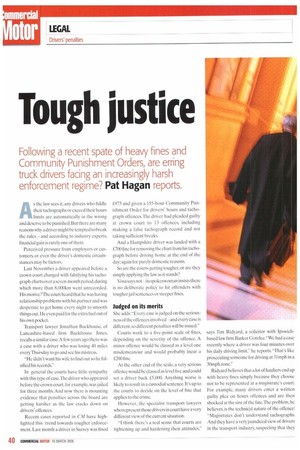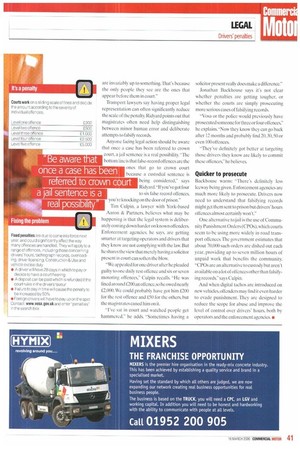Tough justice
Page 40

Page 41

If you've noticed an error in this article please click here to report it so we can fix it.
Following a recent spate of heavy fines and Community Punishment Orders, are erring truck drivers facing an increasingly harsh enforcement regime? Pat Hagan reports.
As the law sees it, any drivers who fiddle their tachographs or exceed their hours limits are automatically in the wrong and deserve to be punished. But there are many reasons why a driver might be tempted to break the rules and according to industry experts. linancial gain is rarely one of them.
Perceived pressure from employers or customers, or even the driver's domestic circumstances may be factors.
Last November a driver appeared before a crown court charged with falsifying his tachograph charts (wer a seven-month period, (luring which more than 8,000km went unrecorded. His motive?The court heard that he was having relationship problems with his partner and was desperate to get home every night to smooth things out. lie even paid for the extra fuel out of his own pocket.
Transport lawyer Jonathan Backhouse. of Lancashire-based firm Back house Jones, recalls a similar case.A few years ago there was a case with a driver who was losing 40 miles every Th ursday to go and see his mistress.
"He didn't want his wife to find out so he falsified his records," In general the courts have little sympathy with this type of case.The driver who appeared before the crown court, for example. was jailed for three months. And now there is mounting evidence that penalties across the board are getting harsher as the law cracks down on drivers' offences.
Recent cases reported in CM have highlighted this trend towards tougher enforcement. Last month a driver in Surrey was fined £975 and given a 155-hour Community Punishment Order for drivers' hours and tachograph offences. The driver had pleaded guilty at crown court to 13 offences, including making a false tachograph record and not taking sufficient breaks.
And a Hampshire driver was landed with a £700 fine for removing the chart from his tachograph before driving home at the end of the day: again for purely domestic reasons.
So are the courts getting tougher, or are they simply applying the law as it stands?
Vosa says not its spokeswoman insists there is no deliberate policy to hit offenders with tougher jail sentences or steeper fines.
Judged on its merits
She adds:"Every case is judged on the seriousness of the offences involved and every case is di Iferent, so different penalties will be issued."
Courts work to a five-point scale of fines, depending on the severity of the offence. A minor offence would be classed as a level one misdemeanour and would probably incur a £200 fine.
At the other end of the scale, a very serious offence would be classed as level five and could set a driver back £5,000. Anything worse is likely to result in a custodial sentence. It's up to the courts to decide on the level of fine that applies to the crime.
However, the specialist transport lawyers who represent those drivers in court have a very different view of the current situation.
"I think there's a real sense that courts are tightening up and hardening their attitudes," says Tim Ridyard, a solicitor with Ipswichbased law firm Barker Gotelee."We had a case recently where a driver was four minutes over his daily driving limit," he reports. "That's like prosecuting someone for driving at 31mph in a :30mph zone."
Ridyard believes that a lot of hauliers end up with heavy fines simply because they choose not to be represented in a magistrate's court. For example. many drivers enter a written guilty plea on hours offences and are then shocked at the size of the fine.The problem, he believes, is the technical nature of the offence: "Magistrates don't understand tachographs. And they have a very jaundiced view of drivers in the transport industry, suspecting that they are invariably up to something.'lhat's because the only people they see are the ones that appear before them in court."
Transport lawyers say having proper legal representation can often significantly reduce the scale of the penalty. Ridyard points out that magistrates often need help distinguishing between minor human error and deliberate attempts to falsify records.
Anyone lacing legal action should be aware that once a case has been referred to crown court, a jail sentence is a real possibility. "The bottom line is that false-record offences are the ones that go to crown court because a custodial sentence is being considered," says Ridyard."ff you've got four to six false record offences. you're knocking on the door of prison."
Tim Culpin, a lawyer with York-based Aaron & Partners, believes what may be happening is that the legal system is deliberately coming down harder on known offenders. Enforcement agencies, he says, are getting smarter at targeting operators and drivers that they know are not complying with the law. But he shares the view that merely having a solicitor present in court can soften the blow.
"We appealed for one driver after he pleaded guilty to one daily rest offence and six or seven motoring offences," Culpin recalls. He was tined around £200 an offence,so he owed nearly £2,000. We could probably have got him £200 for the rest offence and 150 for the others, but the magistrates caned him on it.
"I've sat in court and watched people get hammered," he adds. "Sometimes having a solicitor present really does make a difference."
Jonathan Backhouse says it's not clear whether penalties are getting tougher, or whether the courts are simply prosecuting more serious cases of falsifying records.
"Vosa or the police would previously have prosecuted someone for three or four offences," he explains. Now they know they can go back after 12 months and probably find 20,30.50 or even 100 offences.
-They've definitely got better at targeting those drivers they know are likely to commit these offences," he believes.
Quicker to prosecute Back house warns: "There's definitely less leeway being given. Enforcement agencies are much more likely to prosecute. Drivers now need to understand that falsifying records might get them sent to prison but drivers' hours offences almost certainly won't."
One alternative to jail is the use of Community Punishment Orders (CP0s), which courts seem to be using more widely in road transport offences. The government estimates that about 70,000 such orders are dished out each year, providing up to seven million hours of unpaid work that benefits the community. "CPUs are an alternative to custody but aren't available on a lot of offences other than falsifying records," says Culpin.
And when digital tachos are introduced on new vehicles, offenders may find it even harder to evade punishment. They are designed to reduce the scope for abuse and improve the level of control over drivers' hours, both by operators and the enforcement agencies. •
































































































































































































